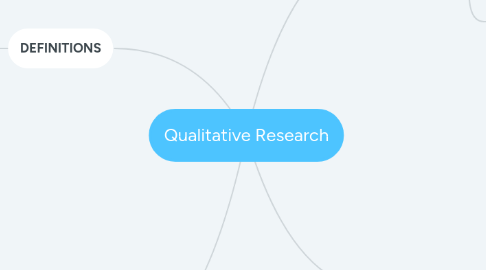
1. ETHICS
1.1. Participants have a vital role, they contribute to the analysis of the data they generate. So the treatment of participants becomes an ethical issue to be considered.
1.2. Codes of ethics have to be set by researches in order to protect participants and support ethical approaches to fieldwork.
1.3. Basic ethical considerations:
1.3.1. 1. Avoid research sites where participants may feel coerced to participate in the research. 2. Honour the participants’ privacy. 3. Consider difference in participants’ time commitment. 4. Protect participants’ identities to avoid embarrassment or harm. 5. Treat participants with respect and seek their cooperation in the research. 6. Negotiate with the participants the terms of the agreement to do a study. 7. Tell the truth when writing up and reporting the findings.
2. CHARACTERISTICS
2.1. Naturalistic
2.1.1. Ecological approaches In biology No experimental approach Studies in their natural settings whose presence might be either known There is no manipulation of the environment
2.2. Descriptive data
2.2.1. The data could imply interview transcripts, photographs, field notes, videos, personal documents, and other official records.
2.3. Concern with process
2.3.1. Qualitative research focuses on process rather than outcomes; that’s why, this uses multiple interactive. =The three main methods of data collection, focus group, in-depth interviews and participant observation
2.4. Inductive
2.4.1. Analyses the data in an inductive which means that theories or concepts are built on the base of gathering data, focus on behaviours, construct theories and reach conclusions.
2.5. Meaning
2.5.1. They´re really interested in participant’s perspectives and these perspectives focus on the assumptions participants make about their lives and what they take for granted.
3. DEFINITIONS
3.1. by
3.1.1. John Creswell (1994)
3.1.1.1. Defines qualitative research as an inquiry process of understanding that is based on distinct methodological traditions of inquiry to explore a social or human problem.
3.1.2. Sharan B. Merriam (2009)
3.1.2.1. Qualitative researchers are interested in understanding the meaning people have constructed, that is, how people make sense of their world and the experiences they have in the world.
3.1.3. Dr. Leslie Curry (2015)
3.1.3.1. Qualitative research is a strategy to collect, organice and interpret textual information systematically to generate insights into phenomena that are difficult to measure quantitatively.
3.2. general definitions
3.2.1. A strategic for systematic collection, organization and interpretation of textual information
3.2.2. It uses inductive approaches to generate novel insights into phenomena that are difficult to measure quantitatively
3.2.3. It can generate a comprehensive description of processes, mechanism or settings
3.2.4. Can characterize participant perspectives and experiences in great depth (INDIVIDUAL HALF BEHAVIOUR)
4. adds
4.1. PRODUCTS OF QUALITATIVE SEARCHING
4.1.1. • Current themes or hypotheses • Survey instrument measures • Taxonomies • Conceptual model or Theories
4.2. IDENTIFY AND CHARACTERIZE:
4.2.1. • Patterns of behaviors • Group interactions • Individual perceptions
4.3. HELP TO DEVELOP TESTABLE HYPOTHESES BY:
4.3.1. • Identifying salient factors • Informing predictions about relationship

